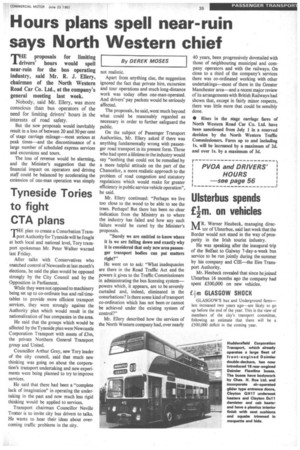Hours plans spell near-ruin says North Western chief
Page 37

If you've noticed an error in this article please click here to report it so we can fix it.
By DEREK MOSES
HE proposals for limiting 1. drivers' hours would spell near-ruin for the bus operating industry, said Mr. R. J. Ellery, chairman of the North Western Road Car Co. Ltd., at the company's general meeting last week.
Nobody, said Mr. Ellery, was more conscious than bus operators of the need for limiting drivers' hours in the interests of road safety.
But the new proposals would inevitably result in a loss of between 20 and 30 per cent of stage carriage mileage—most serious at peak times—and the discontinuance of a large number of scheduled express services and excursions and tours.
The loss of revenue would be alarming, and the Minister's suggestion that the financial impact on operators and driving staff could be balanced by accelerating the extension of one-man operation was simply not realistic.
Apart from anything else, the suggestion ignored the fact that private hire, excursion and tour operations and much long-distance work was today often one-man-operated. And drivers' pay packets would be seriously affected.
The proposals, he said, went much beyond what could be reasonably regarded as necessary in order to further safeguard the public.
On the subject of Passenger Transport Authorities, Mr. Ellery asked if there was anything fundamentally wrong with passenger road transport in its present form. Those who had spent a lifetime in the industry would say "nothing that could not be remedied by a more helpful attitude on the part of the Chancellor, a more realistic approach to the problem of road congestion and statutory regulations which would make for greater efficiency in public service vehicle operation", he said.
Mr. Ellery continued: "Perhaps we live too close to the wood to be able to see the trees. Perhaps! But there has been no clear indication from the Ministry as to where the industry has failed and how any such failure would be cured by the Minister's proposals.
"Surely we are entitled to know where it is we are falling down and exactly why it is considered that only new area passenger transport bodies can put matters right?"
He went on to ask: "What inadequacies are there in the Road Traffic Act and the powers it gives to the Traffic Commissioners in administrating the bus licensing system— powers which, it appears, are to be severely curtailed and, indeed, eliminated in the conurbations? Is there some kind of transport co-ordination which has not been or cannot be achieved under the existing system of control?"
Mr. Ellery described how the services of the North Western company had, over nearly 40 years, been progressively dovetailed with those of neighbouring municipal and company operators and with the railways. On close to a third of the company's services there was co-ordinated working with other undertakings—most of them in the Greater Manchester area—and a recent major review of its arrangements with British Railways had shown that, except in fairly minor respects, there was little more that could be sensibly done.
• Rises in the stage carriage fares of North Western Road Car Co. Ltd. have been sanctioned from July I in a reserved decision by the North Western Traffic Commissioners. Fares up to and including is. will be increased by a maximum of 2d. and over Is. by a maximum of 3d.












































































































